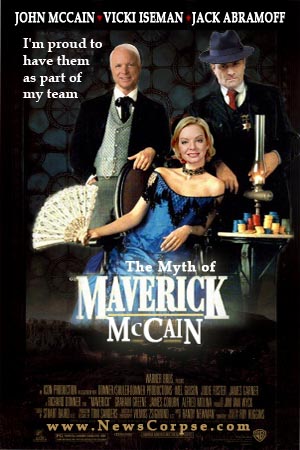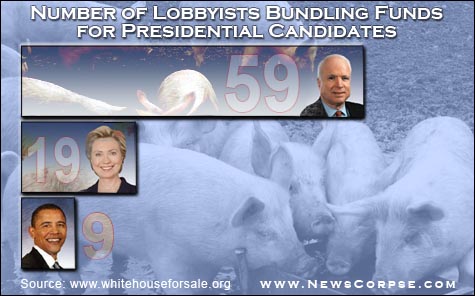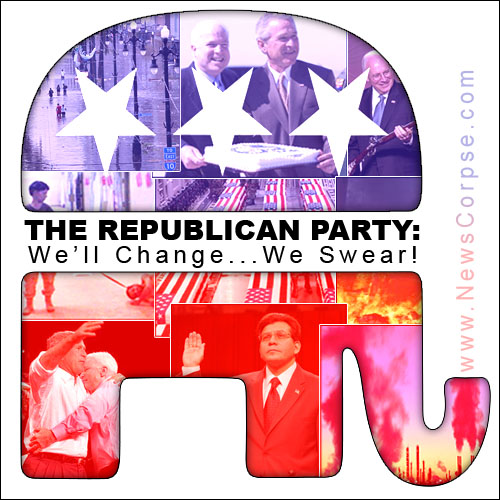 John McCain’s image, as propounded by his spinners (aka: the Media) is that of a maverick who shuns political opportunists and slaps the hands of greedy, special interest self-promoters. It’s an image that gets projected repeatedly by pundits and lazy journalists whose writing seems to be on auto-pilot. They reason that if it was said it about him last year (or last century), it must be true this year as well. This flawed logic even extends to government watchdog groups.
John McCain’s image, as propounded by his spinners (aka: the Media) is that of a maverick who shuns political opportunists and slaps the hands of greedy, special interest self-promoters. It’s an image that gets projected repeatedly by pundits and lazy journalists whose writing seems to be on auto-pilot. They reason that if it was said it about him last year (or last century), it must be true this year as well. This flawed logic even extends to government watchdog groups.
The Austin American- Statesman reports that McCain is circulating a letter from Public Citizen that attests to his commitment to good government:
“We are compelled to note something that has been lost in the recent criticism of Sen. McCain’s association with lobbyists: Regardless of how many lobbyists are working on his campaign or raising money for him, John McCain fought for 14 long, hard years for reforms that seriously limit lobbyists power.”
The “recent criticism” mentioned is probably a reference to the New York Times article detailing McCain’s relationship with Vicki Iseman, a telecommunications lobbyist. Unfortunately, the blowback on the article has been focused on the salacious shenanigans instead of the more substantive financial ones. Still, Public Citizen is articulating a surprisingly positive assessment of a man that scored only 15% on their most recent congressional voting scorecard. What’s more, WhiteHouseForSale.org, a Public Citizen spinoff, ranks McCain as the candidate receiving by far the most contributions bundled by lobbyists.

Yet Public Citizen still praises McCain for his past efforts while dismissing his present indiscretions. I suppose that, once upon a time, Public Citizen would defend the Unabomber because he was once a respected mathematics professor at Berkeley. For his part, McCain dodges charges of hypocrisy by stating simply that his lobbyists are different, they’re better:
“These people have honorable records, and they’re honorable people, and I’m proud to have them as part of my team.”
Media Matters has compiled an extensive profile of the McCain team, and it is littered with political and corporate glad-handers who stand to gain much via their relationship with McCain. This is true whether or not McCain becomes president. He is still a member of the Senate and sits on powerful committees including Commerce and Armed Services.
The presence of such a large contingent of lobbyists on McCain’s payroll raises some troubling questions. These are people who don’t do anything without expecting something in return. Indeed, they have clients who are paying them to produce returns and thus have a fiduciary duty to deliver. Is the press asking that question? And what happens when these staffers go off payroll, as has occurred in the course of McCain’s fiscally-strapped campaign? When lobbyists are working for nothing to advance the interests of a powerful politician, doesn’t that at least suggest an appearance of impropriety? Given that these lobbyists earn hundreds of thousands of dollars, isn’t their unpaid work as principal managers of McCain’s campaign also an unreported contribution? Has the press addressed that issue?
The right-wing criticism of the New York Times story seems to have effectively inoculated McCain from such inquiries. Even though the critics targeted the Iseman affair, their impact has sunk down into any topic covered by the story, including the accurate assertions of McCain’s coziness with lobbyists. McCain’s initial response to the Times displayed an indignant belligerence that promised that, “We’re going to go to war with them now.” But the very next day he changed his tune saying:
“I had a press conference yesterday morning and I am moving on and am talking about the big issues […] I addressed the issue. I addressed every question that was addressed to me. And I do not intend to discuss it.”
Well, that war was much shorter that the 100 years he would have us in Iraq. However, the press must not accept his refusal to discuss the issue of lobbyists attached to his campaign. This is one of the primary arguments he makes for his candidacy, and it is at the center of the image he wants to project to voters. It must, therefore, be at the top of any journalist’s list of issues to raise with the Senator. And if it isn’t, then the press should file it’s own declaration of an in-kind contribution to John McCain and his campaign folklore.
 So Sue Me!
So Sue Me!

 John McCain’s image, as propounded by his spinners (aka: the Media) is that of a maverick who shuns political opportunists and slaps the hands of greedy, special interest self-promoters. It’s an image that gets projected repeatedly by pundits and lazy journalists whose writing seems to be on auto-pilot. They reason that if it was said it about him last year (or last century), it must be true this year as well. This flawed logic even extends to government watchdog groups.
John McCain’s image, as propounded by his spinners (aka: the Media) is that of a maverick who shuns political opportunists and slaps the hands of greedy, special interest self-promoters. It’s an image that gets projected repeatedly by pundits and lazy journalists whose writing seems to be on auto-pilot. They reason that if it was said it about him last year (or last century), it must be true this year as well. This flawed logic even extends to government watchdog groups.